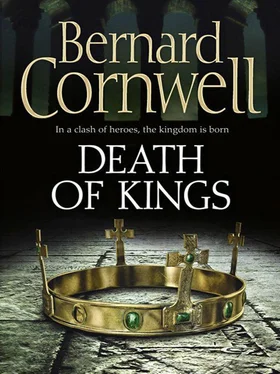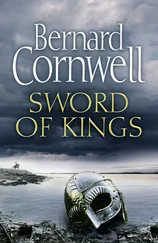‘He has brought crews of pagans,’ Plegmund said, ‘a host!’
‘He is not our business,’ Edward intervened, obviously unhappy at the sharp tone of the last few statements. ‘Our business is to defeat my cousin Æthelwold. Now,’ he looked at me, ‘you will agree our burhs are well defended?’
‘I hope so, lord.’
‘And it is our belief,’ Edward went on, ‘that the enemy will be frustrated by the burhs and so will withdraw soon.’
‘And we shall fight them as they withdraw,’ Plegmund said.
‘So why not fight them south of Cracgelad?’ I asked.
‘Because the men of Cent could not have reached that place in a timely fashion,’ Plegmund said, sounding irritated by my question, ‘and Ealdorman Sigelf has promised us seven hundred warriors. Once they have joined us,’ he went on, ‘we shall be ready to confront the enemy.’
Edward looked at me expectantly, plainly wanting my agreement. ‘It’s surely sensible,’ he finally spoke after I had made no comment, ‘to wait until we have the men of Cent? Their numbers will make our army truly formidable.’
‘I have a suggestion, lord King,’ I said respectfully.
‘All your suggestions are welcome, Lord Uhtred,’ he said.
‘I think that instead of bread and wine the church should serve ale and old cheese,’ I said, ‘and I propose that the sermon should be at the beginning of the service instead of at the end, and I think priests should be naked during the ceremonies, and…’
‘Silence!’ Plegmund shouted.
‘If your priests are going to conduct your wars, lord King,’ I said, ‘then why shouldn’t your warriors run the church?’ There was some nervous laughter at that, but as the council went on it was clear that we were as leaderless as the Danes. The Christians talk about the blind leading the blind, and now the blind were fighting the blind. Alfred would have dominated such a council, but Edward deferred to his advisers, and men like Æthelhelm were cautious. They preferred to wait until Sigelf’s Centish troops had joined us.
‘Why aren’t the men of Cent here now?’ I asked. Cent was close to Lundene and in the time it had taken my men to cross and recross half of Saxon Britain the men of Cent had failed to complete a two-day march.
‘They will be here,’ Edward said, ‘I have Ealdorman Sigelf’s word.’
‘But why has he delayed?’ I insisted.
‘The enemy went to East Anglia in ships,’ Archbishop Plegmund supplied the answer, ‘and we feared they might use those ships to descend on the coast of Cent. Ealdorman Sigelf preferred to wait until he was sure that the threat was not real.’
‘And who commands our army?’ I asked, and that question caused embarrassment.
There was silence for a few heartbeats, then Archbishop Plegmund scowled. ‘Our lord King commands the army, of course,’ he said.
And who commands the king, I wondered, but said nothing. That evening Edward sent for me. It was dark when I joined him. He dismissed his servants so we were alone. ‘Archbishop Plegmund is not in charge,’ he chided me, obviously remembering my final question in the council, ‘but I find his advice is good.’
‘To do nothing, lord King?’
‘To gather all our forces before we fight. And the council agrees.’ We were in the large upper room where a great bed stood between two candle-lanterns. Edward was standing in the large window that overlooked the old city, the window where Æthelflaed and I had stood so often. It looked west towards the new city where soft firelight glimmered. Farther west it was dark, a black land. ‘The twins are safe?’ Edward asked me.
‘They’re in Cirrenceastre, lord King,’ I said, ‘so yes, they’re safe.’ The twins, Æthelstan and Eadgyth, were with my daughter and younger son, all in good hands inside Cirrenceastre, a burh that was as well defended as Cracgelad. Fagranforda had been burned as I had expected, but my people were all safe inside Cirrenceastre.
‘And the boy is in good health?’ Edward asked anxiously.
‘Æthelstan’s a lusty baby,’ I said.
‘I wish I could see them,’ he said.
‘Father Cuthbert and his wife are looking after them,’ I said.
‘Cuthbert’s married?’ Edward asked, surprised.
‘To a very pretty girl,’ I said.
‘Poor woman,’ Edward said, ‘she’ll be riddled to death by him.’ He smiled, and looked unhappy when I did not return the smile. ‘And my sister’s here?’
‘Yes, lord King.’
‘She should be looking after the children,’ he said sternly.
‘You tell her, lord King,’ I said, ‘and she’s brought you almost a hundred and fifty Mercian warriors,’ I went on. ‘Why hasn’t Æthelred sent any?’
‘He’s worried about the Irish Norsemen,’ he said, then shrugged when I made a dismissive noise. ‘Why didn’t Æthelwold go deeper into Wessex?’ he asked me.
‘Because they’re leaderless,’ I said, ‘and because no one came to his banner.’ Edward looked puzzled. ‘I think their plan was to reach Wessex, proclaim Æthelwold king, and wait for men to join them, but no one did.’
‘So what will they do?’
‘If they can’t take a burh,’ I said, ‘they’ll go back where they came from.’
Edward turned to the window. Bats flitted in the darkness, sometimes showing briefly in the light of the lanterns that lit the high room. ‘There are too many of them, Lord Uhtred,’ he said, talking of the Danes, ‘just too many. We must be sure before we attack.’
‘If you wait for certainty in war, lord King,’ I said, ‘you’ll die waiting.’
‘My father advised me to hold on to Lundene,’ he said. ‘He told me we should never relinquish the city.’
‘And let Æthelwold have the rest?’ I asked sourly.
‘He will die, but we need Ealdorman Sigelf’s men.’
‘He’s bringing seven hundred?’
‘So he promised,’ Edward said, ‘which will give us over four thousand men.’ He took comfort in that number. ‘And, of course,’ he went on, ‘we now have your men and the Mercians too. We should be strong enough.’
‘And who commands us?’ I asked in a gruff voice.
Edward looked surprised at the question. ‘I do, of course.’
‘Not Archbishop Plegmund?’
Edward stiffened. ‘I have advisers, Lord Uhtred,’ he said, ‘and it’s a foolish king who doesn’t listen to his advisers.’
‘It’s a foolish king,’ I retorted, ‘who doesn’t know which advisers to trust. And the archbishop has advised you to mistrust me. He thinks I’m sympathetic to the Danes.’
Edward hesitated, then nodded. ‘He worries about that, yes.’
‘Yet so far, lord King, I’m the only one of your men who has killed any of the bastards. For a man who can’t be trusted that’s strange behaviour, is it not?’
Edward just looked at me, then flinched as a large moth fluttered close to his face. He called for servants to close the big shutters. Somewhere in the dark I could hear men singing. A servant took the robe from Edward’s shoulders, then lifted the gold chain from around his neck. Beyond the arch, where the door stood open, I could see a girl waiting in the dark shadows. It was not Edward’s wife. ‘Thank you for coming,’ he said, dismissing me.
I bowed to him, then went.
And next day Sigelf arrived.
The fight began in the street below the big church next to the old Mercian palace where Edward and his entourage were quartered. The men of Cent had arrived that morning, streaming across the Roman bridge and beneath the broken arch that led through Lundene’s river wall. Six hundred and eighty-six men, led by their ealdorman, Sigelf, and his son, Sigebriht, rode beneath banners showing Sigelf’s crossed swords and Sigebriht’s bloody-horned bull’s head. They had dozens of other flags, most with crosses or saints, and the horsemen were accompanied by monks, priests and wagons loaded with supplies. Not all Sigelf’s warriors were mounted, at least one hundred came without horses, and those men straggled into the city for a long while after the horsemen had arrived.
Читать дальше
Конец ознакомительного отрывка
Купить книгу












